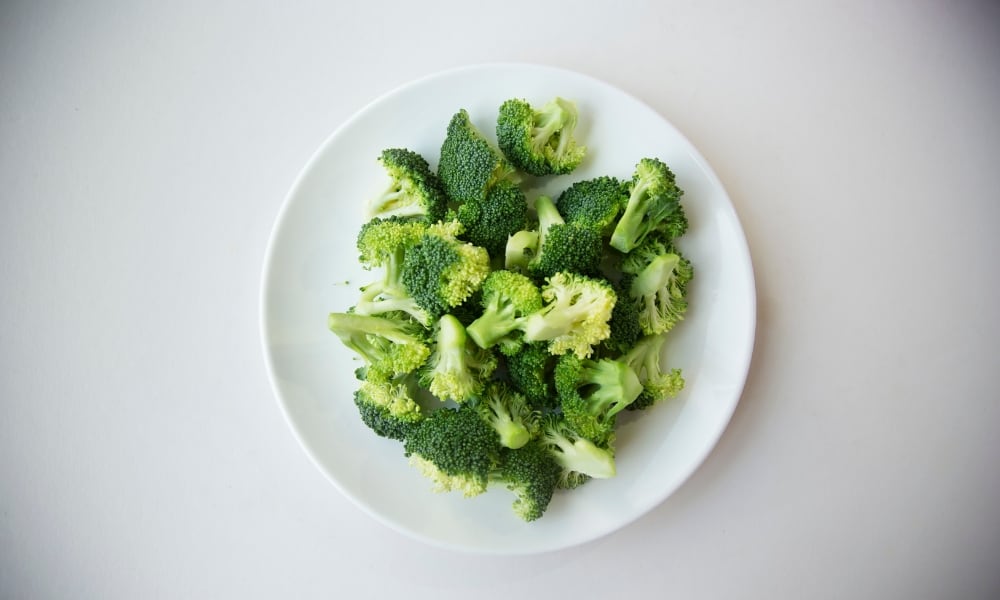9 Health Benefits of Sulforaphane and Where to Find It

“Eat your broccoli – it’s good for you!”
As kids, how many times did we hear that phrase and turn our nose up at the veggies on our plate?
Mom was right though. All cruciferous veggies like broccoli, cauliflower, brussels sprouts, and kale contain a powerful compound called sulforaphane which boasts numerous health benefits worth learning about.

What Is Sulforaphane?
Sulforaphane is a natural substance found in a specific group of plants called cruciferous vegetables. Cruciferous veggies get their name from the crucifix shape their leaves or petals make. In the U.S., farmers may call them “cole crops.”
Cruciferous foods also contain high levels of sulfur. This is why certain people may notice particularly bad gas after eating broccoli or cabbage. However, sulforaphane is extremely good for the body and beneficial for cancer prevention so don’t let it get to you.
You can get your daily fix of sulforaphane by consuming cruciferous veggies like broccoli and kale. You can also take a sulforaphane supplement which is usually derived from broccoli plants or broccoli extracts.
But there’s a catch: sulforaphane is sensitive.
Inside foods, sulforaphane takes on a different and inactive form called glucoraphanin. When broccoli or cabbage is damaged, it releases an enzyme called myrosinase as a defense mechanism. When glucoraphanin gets a whiff of myrosinase, it turns into sulforaphane.
We’re not done yet – it gets even more complex.
Cooking with high temperatures can damage the glucoraphanin and limit your available sulforaphane. One study found that the sulforaphane content is ten-times higher in raw broccoli as opposed to cooked broccoli. (1)
A little heat is okay. Limit your cooking to light steaming below 248 degrees Fahrenheit to enjoy the highest sulforaphane content.

9 Health Benefits of Sulforaphane
While you may not have appreciated her effort at the time, your mom was doing the right thing by filling your plate with green leafy goodness.
Here are the top health benefits of sulforaphane.
1. May Prevent Cancer Cell Growth
Obviously, sulforaphane isn’t a miracle cure for cancer. It does, however, have anti-cancer properties.
In studies, sulforaphane was found to reduce the size and amount of many types of cancerous cells. The antioxidants in sulforaphane can help protect the body against developing cancerous cells. (2, 3)
That’s likely why populations who consume high levels of sulforaphane have lower cancer risks, on average. (4)
2. Has a Protective Effect on the Heart
Heart disease is the leading cause of death in the United States. Over time, plaque builds in the artery walls from high-cholesterol diets which can cause the arteries to harden and lead to other dangerous complications. (5)
Not only are sulforaphane-rich foods cholesterol-free, but they also have plenty of promise for reducing your risk of heart disease. Studies have found that the antioxidants in sulforaphane can reduce your risk of arteriosclerosis (hardening of the arteries) and lower inflammation in vascular cells. (6)
3. Can Help Regulate Blood Sugar
Diabetics, especially type-2 diabetics, should consider including sulforaphane-rich foods in their daily diets.
Studies have found that sulforaphane extracts can significantly lower blood sugar levels in folks with type-2 diabetes. (7)
4. Acts as an Anti-Inflammatory
Chronic inflammation leads to many problems across the body such as acne, joint pain, anxiety, and heart disease.
Sulforaphane and other antioxidants in cruciferous veggies seem to have anti-inflammatory properties which can help counter these problems.
Most studies have looked at sulforaphane’s isolated anti-inflammatory actions in areas such as the lungs or heart. (8)
5. Supports a Healthy Brain
A handful of studies have found that sulforaphane can protect the brain against long-term damage following traumatic injuries and lead exposure such as memory loss and cognitive decline. (9)
It’s unclear whether or not sulforaphane can protect the brain against age-related brain memory loss and decreased cognitive function.
However, it can’t help to add sulforaphane-rich foods to your diet as a precaution.
6. Can Regulate Blood Pressure
30% of adults in the United States have high blood pressure which leads to dangerous complications like heart attack and stroke. If you’re already battling high blood pressure or at risk for developing it, consider adding sulforaphane-rich foods or a supplement to your diet. (10)
Studies have found that sulforaphane may lower blood pressure levels. Keep in mind that no plant or substance is a miracle solution so make sure to change your overall diet and exercise for the best results. (11)
7. Supports the Liver
Your liver is responsible for detoxifying the body. Unfortunately, high-fat, high-sugar, and high-sodium foods, as well as alcohol, can all take their toll and lead to various types of fatty liver disease.
The liver healing properties of sulforaphane come from its antioxidant qualities which protect against oxidative stress.
Studies on rats found that sulforaphane supplements significantly reduced liver disease markers and improved liver function. (12)
8. May Reduce Autism Symptoms
Nothing will cure autism. For folks living with autism themselves or loved ones with the condition, it’s crucial to manage symptoms and avoid potential triggers. Some plants and substances can reduce the severity of autism symptoms.
One study looked at men with autism spectrum disorders. It found that the men who consumed sulforaphane supplements saw a reduction in symptoms such as impaired communication and social issues. (13)
9. Has Antioxidant Properties to Reduce Oxidative Stress
Antioxidants play a large role in defending the body against oxidative stress and free radical damage. Oxidative stress and free radical damage lead to visible signs of aging as well as age-related diseases such as cancer, dementia, diabetes, and heart disease.
Sulforaphane has powerful antioxidant properties to help protect your body against free radical damage. Aside from the benefits mentioned here, sulforaphane-rich foods likely boast many other benefits that have yet to be confirmed through scientific studies.
Sulforaphane and Prostate Cancer
Sulforaphane has general anti-cancer properties, but it’s studied well against prostate cancer. Prostate cancer is the most common cancer among men in the United States after skin cancer. (14)
A diet full of sulforaphane-rich foods or supplements can help prevent prostate cancer. Sulforaphane supplements also show promise as part of a comprehensive cancer treatment plan.
Studies on mice have found that consuming broccoli on a daily basis can reduce the likelihood of developing prostate cancer. In mice that developed prostate cancer, it was found to limit the illness’s severity.(15)
Another study determined that sulforaphane creates an environment that’s too hostile for cancerous cells to develop or progress. This is likely why sulforaphane shows promise for reducing even the most aggressive forms of prostate cancer. (16)

Sulforaphane and Breast Cancer
After skin cancer, breast cancer is the most common cancer in women – across all races and ethnicities. (17) Women can also take advantage of the cancer-fighting properties in sulforaphane to defend against breast cancer.
Sulforaphane is extremely well-studied for its use against breast and prostate cancer.
Lab studies have found that sulforaphane injections successfully reduced the number and size of breast cancer stem cells. (18) Other lab studies discovered that sulforaphane can suppress the growth of triple-negative breast cancer cells – a particularly aggressive type of breast cancer. (19)
But sulforaphane doesn’t just fight current cancer cells, it can also prevent cancer from developing in the first place. Like men, the sulforaphane likely creates a hostile environment that makes it difficult for cancer cells to thrive. (20)
Broccoli and cabbage aren’t miracle cures, but it can’t hurt to include them into your daily diet – especially if you have a family history of breast cancer. You could also add a sulforaphane supplement to your routine – one or two capsules per day should be enough but studies have not determined a proper dose.
Side Effects of Sulforaphane and Interactions
When consumed in average food amounts, there are no known side effects to sulforaphane.
If you have a sensitive stomach, you may notice some bloating, gas, or discomfort after eating cruciferous vegetables or taking a sulforaphane supplement.
However, it’s especially important to keep an eye out for drug interactions.
Avoid sulforaphane if you take any medications metabolized by the liver. Truthfully, you shouldn’t even consume large amounts of cruciferous foods if you take specific medications – even small amounts of sulforaphane can affect your dosage.
Powerful sulforaphane changes how your body metabolizes medications in the liver which can decrease your bioavailability and half-life of these medications. Check with your doctor before consuming too many cruciferous foods if you take medications like haloperidol, clozapine, or theophylline.
You should also be careful if you take medications like warfarin as cruciferous veggies can increase your risk of allergies and genotoxicity.

Where Can You Find Sulforaphane?
You can find sulforaphane in supplement form either online or at your local vitamin store. You can also consume cruciferous foods such as the following veggies.
- Broccoli, broccolini, broccoli sprouts
- Cabbage
- Brussels sprouts
- Kale
- Collard greens
- Cauliflower
- Mustard greens
- Watercress
- Chinese cabbage
- Arugula
- Maca
- Horseradish
The Bottom Line
Cruciferous plants with sulforaphane are some of the best cancer-fighting and cancer-preventing foods you can consume.
Sulforaphane is well-studied for preventing and fighting prostate and breast cancer.
Plus, it has many other health benefits to protect your heart, liver, and other parts of the body. Why not get your fill every day?